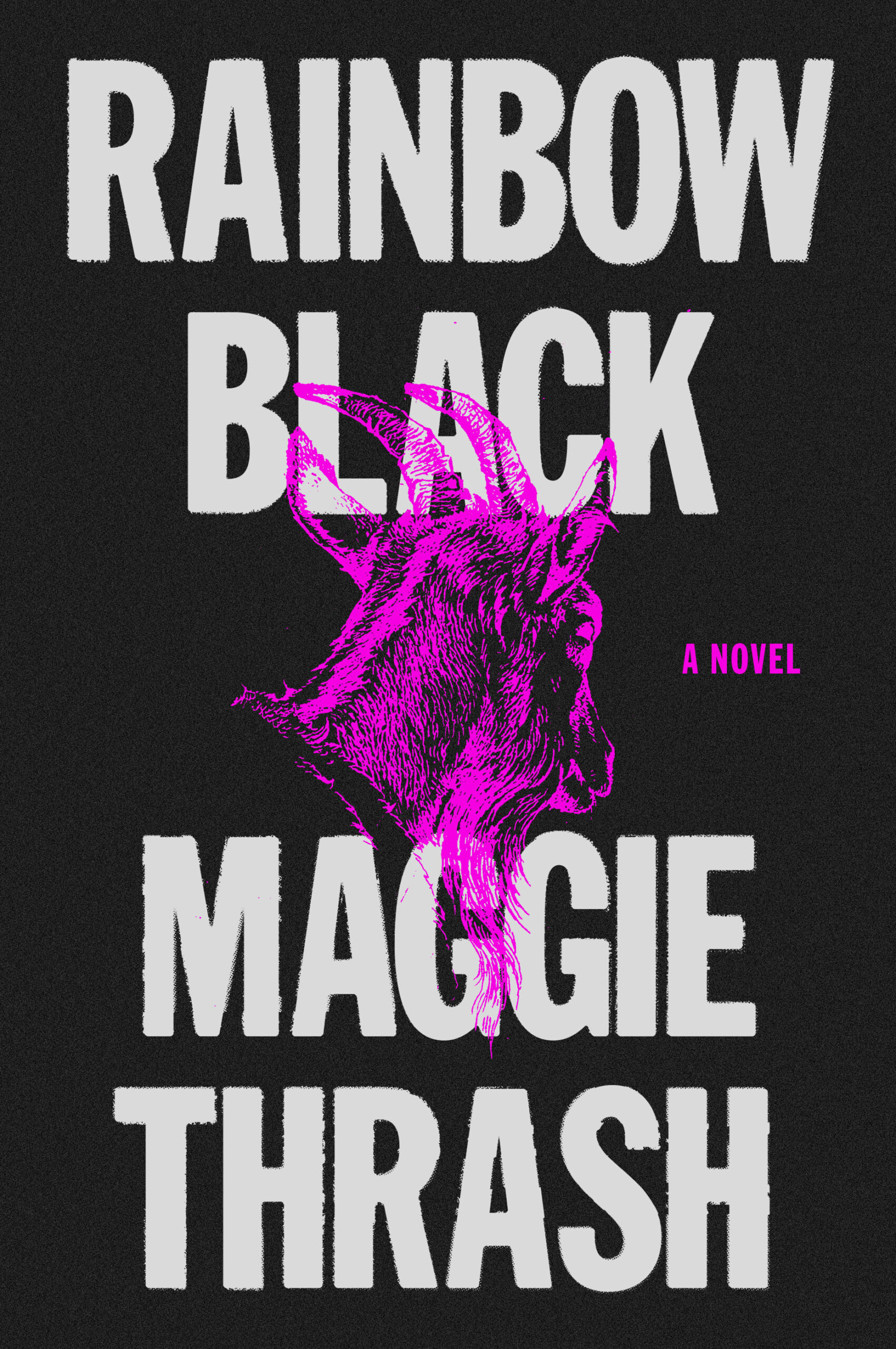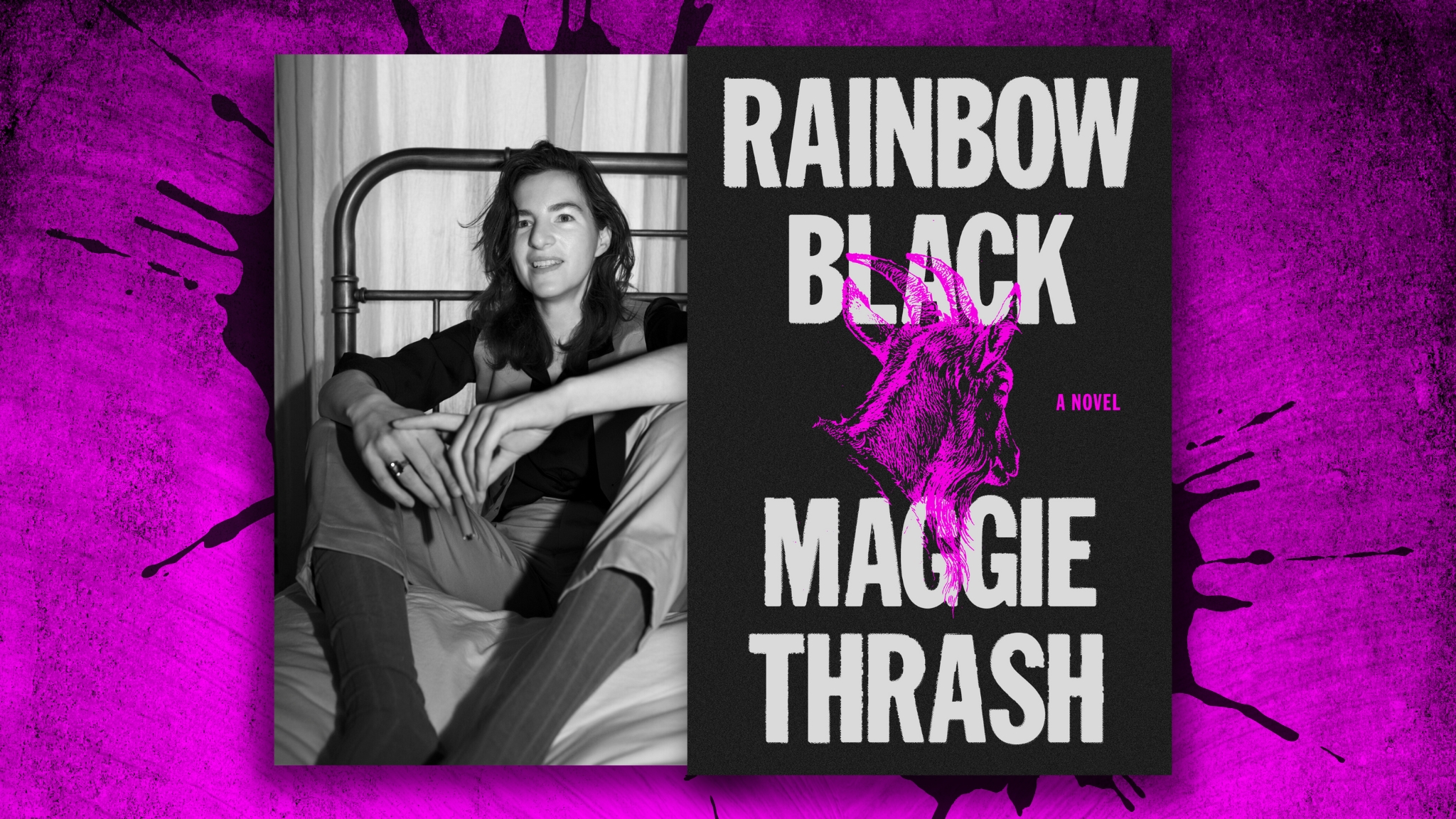Rainbow Black by Maggie Thrash
“Conformity can rapidly become dangerous. It can become violent. I wanted to explore that, and New Hampshire, with its motto ‘Live Free or Die,’ was the perfect setting for that theme.”
Rainbow Black (Harper Perennial), Maggie Thrash’s adult debut, begins in idyllic New Hampshire, on the cusp of impending danger, when the Satanic Panic is reaching its height.
“I’ve always had a crush on New Hampshire,” Thrash, who grew up in Atlanta, shares in an interview with BookTrib. “…New Hampshire was always alluring to me. Beautiful but harsh. It’s not as tamed as the other New England states.”
It is the summer of 1990 when Lacey Bond returns from a movie to find her parents missing from their rural home, the faint sight of a police car heading in the other direction, her older sister smoking a cigarette on the porch. Her hippie parents, caretakers at Rainbow Kids Care, have been arrested.
Lacey is 13, caught in that blissful age between child and teenager where curiosity is encouraged and responsibility is just out of reach. And just like that, she is alone, a child left behind with no adult supervision, handed off to various lawyers and therapists, forced to grow up before her time.
The accusations against her parents are harrowing — from Satanic rituals to sexual abuse — and everyone keeps insisting that Lacey is one of the victims. But she doesn’t remember a thing.
Of course, the story isn’t all fiction, says Thrash, who carefully researched the phenomenon she based Rainbow Black on.
“I was very much influenced by the real-life case of the McMartin preschool trial which took place between 1983-1990. Millions of dollars were spent investigating and prosecuting day care givers who were falsely accused of Satanic ritual child abuse. Eventually all the charges were dropped, but not before their business and their lives had been absolutely ruined.”
When women began to enter the workforce, children were dropped into the hands of daycares, spending more time with strangers than their own parents. Fears about what went on in the care of strangers grew into full-fledged panic, and eventually national hysteria. From murderous witch hunts to criminal trials, people’s lives and families were torn apart by false accusations.
Lacey, a casualty in the hysteria targeting her parents, is thrust into a group home. This decision is tinged with irony and the knowledge that Lacey, too, will be cared for by complete strangers. But the neglect and abuse she faces there are quite real. At times, it seems, there is not a single adult who won’t take advantage of a young girl’s vulnerability and helplessness, a feeling Maggie Thrash appears to know firsthand.
“I had a very harrowing experience with bureaucracy when I was a teenager. These systems are full of well-meaning people, but there’s also a lot of people wildly abusing their power positions. It’s just luck of the draw whether the person dealing with your issue will be one to treat you like a human being or a piece of trash. It’s scary. Your file lands on some stranger’s desk, and they have the power to ruin your life ⎯ or save your life. It’s totally up to them.”
Knowing Lacey is the only one who can save herself, she takes matters into her own hands and plots her escape. Soon, her life goes careening off into dangerous territory, and what was once a hard-hitting court drama and murder mystery transforms into a fugitive love story.
Twenty years into the future, Lacey and her girlfriend are trying to leave the past in the past, still haunted by the things they have endured. They are forever changed, unable to escape the lives cemented for them at an impossibly young age, a topic that Thrash approached through the lens of childhood psychology.
“It’s scary, the idea that a person’s character is more or less set by the time you’re a teenager. You probably won’t fundamentally change that much after that. You’ll just get older.”
Now a law clerk, adult Lacey, now called “Jo”, is working on a grueling case, grasping for a way to have control over a system that did nothing but harm her.
Her girlfriend, Gwen, is the only one who understands the intricacies of what she has lived through and what it means to live a life in hiding. Bonded by circumstance and loss, these women have been victimized and scapegoated by a society that isn’t kind to people who refuse to conform. Lacey’s queerness is a vital part of the novel, as early on, the court claims parental abuse is the reason she is a lesbian, that it is some sort of unnatural perversion induced by Satanic rituals.
A modern readership will find it easy to parallel the mass hysteria of the Satanic Panic and the harmful rhetoric being spread about queer and trans people in recent years. The “witch hunt” mentality, as people look for someone to blame for young people’s resistance to tradition and conformity, is terrifying. But as someone who’s done the research and seen the way the world recovered from the Satanic Panic, Thrash says not to fear.
“My hope is that queer people can try not to internalize the panic around their identities. Because it has nothing to do with you as an individual. I know it’s hard to handle in the moment, but if you can take a step back and separate yourself from society’s anxiety, you’ll be okay.”
Readers can also be assured that this isn’t the last we’ll see of Maggie Thrash, who started writing three different novels in the past two years.
“One by one, I had to abandon each project because they didn’t feel right. That said, I don’t consider any work to be a waste of time. You never know where ideas could lead. Hopefully the fourth time’s the charm!”
We’re not sure what’s coming next, but if Thrash’s next book is as darkly funny, haunting and captivating as Rainbow Black, we’ll certainly be ready for it when it comes.
See above the article to download an excerpt from Rainbow Black.
Excerpt extracted from RAINBOW BLACK. Copyright © 2024 by Margaret Thrash. Reprinted here with permission from Harper Perennial, an imprint of HarperCollins Publishers.
About Maggie Thrash:
 Maggie Thrash is a lesbian writer wrestling with important themes, including sexuality, transphobia, and identity. She is unafraid of plumbing dark waters with an off-kilter humor and storytelling bravado reminiscent of the writing of Nell Zink, Alissa Nutting, Donna Tartt, and Ottessa Moshfegh, as well as TV series such as Euphoria, Skins, Yellowjackets, Bad Sisters, and Fleabag. Besides Honor Girl, she is the author of Lost Soul, Be At Peace, as well as two other novels for young adults. Born and raised in Atlanta, she now lives in New Hampshire. For more on Maggie and her work, visit her website.
Maggie Thrash is a lesbian writer wrestling with important themes, including sexuality, transphobia, and identity. She is unafraid of plumbing dark waters with an off-kilter humor and storytelling bravado reminiscent of the writing of Nell Zink, Alissa Nutting, Donna Tartt, and Ottessa Moshfegh, as well as TV series such as Euphoria, Skins, Yellowjackets, Bad Sisters, and Fleabag. Besides Honor Girl, she is the author of Lost Soul, Be At Peace, as well as two other novels for young adults. Born and raised in Atlanta, she now lives in New Hampshire. For more on Maggie and her work, visit her website.




